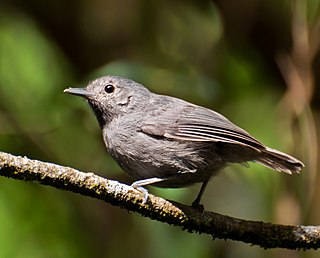
Bonitos are a tribe of medium-sized, ray-finned predatory fish in the family Scombridae – a family it shares with the mackerel, tuna, and Spanish mackerel tribes, and also the butterfly kingfish. Also called the tribe Sardini, it consists of eight species across four genera; three of those four genera are monotypic, having a single species each. Bonitos closely resemble the skipjack tuna.

The sambar is a large deer native to the Indian subcontinent, South China, and Southeast Asia that is listed as a vulnerable species on the IUCN Red List since 2008. Populations have declined substantially due to severe hunting, local insurgency, and industrial exploitation of habitat.

The unicolored jay is an Aphelocoma jay native to cloud forests of northwestern Central America and southern and southeastern Mexico, from central Honduras west to central Guerrero, southern Veracruz and extreme southern San Luis Potosí. It is apparently a basal member of its genus. At Montebello, Chiapas, it is a cooperative breeder.

The Antipodes parakeet or Antipodes Island parakeet is a parrot in the family Psittaculidae that is endemic to the Antipodes Islands of New Zealand. It is one of two parrot species found on the islands, and one of only five ground-dwelling parrots in the world. They are long-living birds that may live up to 10 years of age, but the introduction of mice that compete with them for food is a threat to their survival on the Antipodes Islands. Unusually for parrots, they sometimes prey upon other birds, a trait shared by another New Zealand parrot, the kea.

The Boridae are a small family of beetles with no vernacular common name, though recent authors have coined the name conifer bark beetles. They feed on decaying cambium and require forests with standing dead trees and with intensive forest management some species have become rare and threatened.
The short-furred Atlantic tree-rat or Wagner's Atlantic tree rat, is a spiny rat species from South America. It is found in Brazil.

The brown lanternshark or bristled lanternshark is a little-known species of deep-sea dogfish shark in the family Etmopteridae. It is found off Japan and New Zealand, and possibly also South Africa and Australia, typically deeper than 300 m (980 ft). This species can be distinguished from other lanternsharks by its coloration, which is a uniform dark gray or brown without the ventral surface being much darker and clearly delineated from the rest of the body. The brown lanternshark feeds on small bony fishes, cephalopods, and crustaceans. Reproduction is ovoviviparous, with females giving birth to 9–18 young. An unusually high proportion of individuals in Suruga Bay are hermaphrodites, with both male and female characteristics.

The Banggai crow is a member of the crow family from Banggai regency in the province of Central Sulawesi in Indonesia. It is listed as critically endangered by IUCN. It was feared extinct, but was finally rediscovered during surveys on Peleng Island off the southeast coast of Sulawesi by Indonesian ornithologist Mochamad Indrawan in 2007 and 2008.

The Sri Lankan sambar or Indian sambar - it is also spelt "sambhur" or "sambur" - ගෝනා (gōṇā) in Sinhala, is a subspecies of the sambar that lives in India and Sri Lanka. This subspecies is one of the largest sambar subspecies, with the largest antlers both in size and in body proportions. Large males weight up to 270–280 kg. Sambar live in both lowland dry forests and mountain forests. Large herds of sambar roam the Horton Plains National Park, where it is the most common large mammal.

The variable oystercatcher is a species of wader in the family Haematopodidae. It is endemic to New Zealand. The Maori name is torea-pango. They are also known as 'red bills'.

The unicolored antwren is a species of bird in the family Thamnophilidae. It is endemic to southeastern Brazil.

The brown-tailed mongoose, brown-tailed vontsira, Malagasy brown-tailed mongoose, or salano is a species of mammal in the family Eupleridae. It is endemic to Madagascar. Its natural habitat is subtropical or tropical dry forests. It is threatened by habitat loss.

The Sambirano woolly lemur, also known as the Sambirano avahi or unicolor woolly lemur, is a species of woolly lemur native to western Madagascar.

Several extinct species have been postulated, but owing to a lack of evidence they can only be regarded as hypothetical extinct species. They have caused confusion, as they may have been a separate species, a subspecies, an introduced species or a misidentification.

Hypoplectrus unicolor, the butter hamlet or yellowtail hamlet, is a species of marine ray-finned fish, a sea bass from the subfamily Serraninae which is part of the family Serranidae, which also includes the groupers and anthias. It occurs in the western central Atlantic Ocean and occasionally makes its way into the aquarium trade.

Byturidae, also known as Fruitworms, is a very small family of beetles, in the suborder Polyphaga, comprising fewer than 20 species worldwide. The larvae of some species develop in fruits. Byturus unicolor affects species of Rubus and Geum.

Leiopotherapon unicolor, the spangled grunter or spangled perch is a species of ray-finned fish, a grunter from the family Terapontidae. It is endemic to Australia.
Caprodon is a small genus of fish belonging to the subfamily Anthiinae. It contains three species.
Trichohestima biroi is a species of beetle in the family Cerambycidae. It was described by Breuning in 1953.
Trichohestima setifera is a species of beetle in the family Cerambycidae. It was described by Breuning in 1943.















